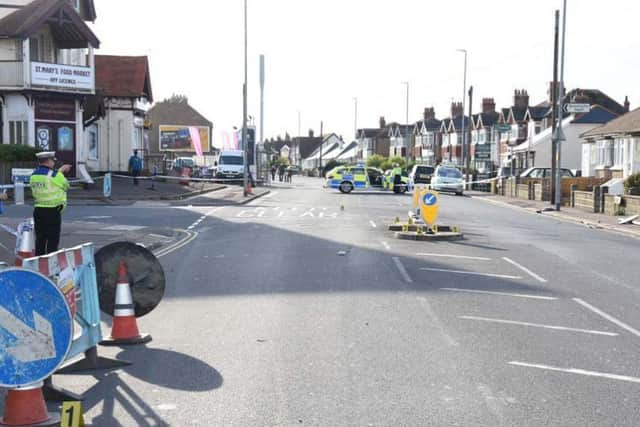Death crash driver '˜may have suffered an epileptic seizure'


Richard Stemler, 70, of Wishing Tree Road, St Leonards, denies causing death by dangerous driving at Hove Crown Court.
Harley Simpson, 11, of Bulverhythe Road, St Leonards, died in hospital on November 4, 2016, after being involved in a collision with Mr Stemler’s silver Renault Espace, in Bexhill Road, on October 22, 2016.
Advertisement
Hide AdAdvertisement
Hide AdAt Hove Crown Court, on Wednesday (March 14), Dr Khaled Abdel-Aziz, a consultant neurologist who examined Mr Stemler in February 2017, said it was ‘likely’ Mr Stemler - who had undergone an operation to have a brain tumour removed in May 2016 - had suffered from an epileptic seizure at the time of the collision.


In a statement read to the court by Edward Hand, prosecuting, Dr Abdel-Aziz said: “It appears Mr Stemler’s driving was relatively unimpaired until metres before the collision.
“There was a part of the journey where Mr Stemler would have had to have manoeuvred his car around two bends which he would not have been able to do without awareness.
“He was only noticed to be coming out of his lane metres before the incident. His loss of awareness must have been very brief.”
Advertisement
Hide AdAdvertisement
Hide AdConsultant neurosurgeon Mr James Kellerman, who was also called to the witness box on Wednesday, agreed with Dr Abdel-Aziz’s conclusion that Mr Stemler had suffered a ‘focal epileptic seizure’ in the moments before the collision.
He said: “He may well have been a passenger in the car as he had no capability to control his own car.
“(Before the incident) he had no significant previous incidents to affect his driving.
“In the weeks before the collision he had driven up through Spain and France to Calais before crossing to the United Kingdom. He had suffered no effects on that drive.”
Advertisement
Hide AdAdvertisement
Hide AdIn his opening statement read to the court on Tuesday (March 12), Edward Hand, prosecuting, said the ‘issue of this trial will be whether Mr Stemler should have been driving at all’.
He said Mr Stemler, under UK law, was ‘under an obligation’ to report his surgery to the DVLA before driving which he did not do.
On Wednesday, the court was told of an occasion on June 9, 2016 – three days after being released from hospital following his operation – Mr Stemler collapsed in Spain and was unconscious for a period of three minutes.
Dr Abdel-Aziz said Mr Stemler was taken to hospital in Spain and treated for symptoms ‘akin to a seizure’ but there was no record to suggest he had been told not to drive.
Advertisement
Hide AdAdvertisement
Hide AdHe said: “The duty is usually on the doctor to advise a patient to contact the DVLA about an operation. The duty is on the patient to then contact the DVLA. There is no record to suggest he was advised not to drive.”
Mr Kellerman also agreed there was no record of Mr Stemler being told not to drive.
He said: “Mr Stemler told me he thought he had been told not to drive for four weeks (after the incident in June 2016).
“Mr Stemler told me he did not drive for approximately five weeks (after the incident in June 2016) by which time he said he felt much better.”
The trial continues.